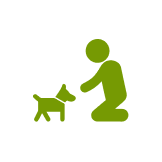In 24 cities
Is Your Dog’s Food Really Working for Their Gut?
|
|
Time to read 1 min
Get product availability and delivery timelines based on your location.
No saved addresses found
Add an address to see it hereAre you sure you want to delete this address?
100% Authentic

Easy return policy

Help us ensure a smooth delivery
Help us ensure a smooth delivery
SIZE GUIDE
Written by: Dr. Shantanu Kalambi
|
|
Time to read 1 min
Digestive health doesn’t just affect poop — it influences your dog’s energy, skin, mood, and immunity. Many common signs like loose stools, excessive gas, dull coat, or low appetite may indicate that their current food isn’t the right match.
A healthy gut = better digestion, stronger immunity, and visible vitality.
Irregular or soft poop
Excessive flatulence or bloating
Dull coat or itchy skin
Low appetite or frequent skipping of meals
Factor |
Why It Matters |
Life Stage |
Puppies, adults, and seniors require different nutrients. |
Activity Level |
Energetic dogs need more calories, protein, and joint support. |
Breed & Size |
Small breeds have faster metabolisms; large breeds need joint and bone support. |
Digestive Sensitivities |
Some dogs may react to common proteins, grains, or additives. |
Nutrient |
Benefit |
Prebiotics & Fiber |
Support beneficial gut bacteria and smooth digestion |
High-Quality Animal Protein |
Promotes lean muscle and supports metabolism |
Omega-3 & Omega-6 Fatty Acids |
Reduce inflammation and support skin & coat |
Digestive Enzymes or Probiotics |
Aid in nutrient absorption and stool consistency |
Profile |
Food Tip |
Active Dog + Loose Stool |
High-protein with prebiotics; look for “sensitive stomach” labels |
Senior Dog + Low Activity |
Lower fat, added fiber, with joint and gut support |
Small Breed + Gas or Inconsistent Poop |
Nutrient-dense small kibble + gut-soothing herbs |
Dog with Food Sensitivities |
Limited-ingredient diet with novel protein like fish or duck |
After vet consultation for chronic gut issues
If switching life stages (puppy → adult, adult → senior)
Seasonal changes or lifestyle updates (less/more activity)
Recent signs of GI discomfort or food boredom
Your dog’s digestion is personal. A generic food may not work forever — or at all.
Let your SuperCompanion guide you toward:
Tailored food recommendations
Transition plans to shift food safely
Supplement advice for smoother digestion



In 24 cities

Happy pet parents

For every new member

Exclusive
2 item in cart
₹10,360


